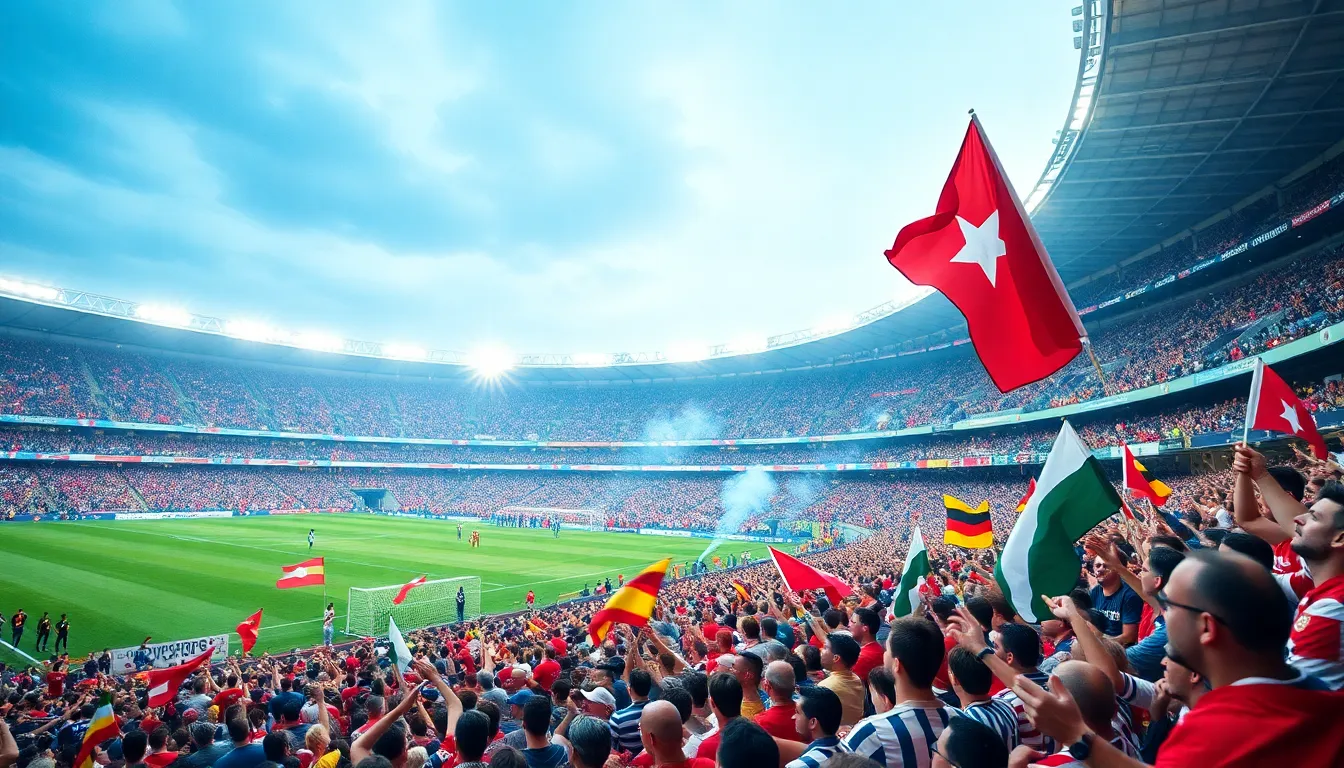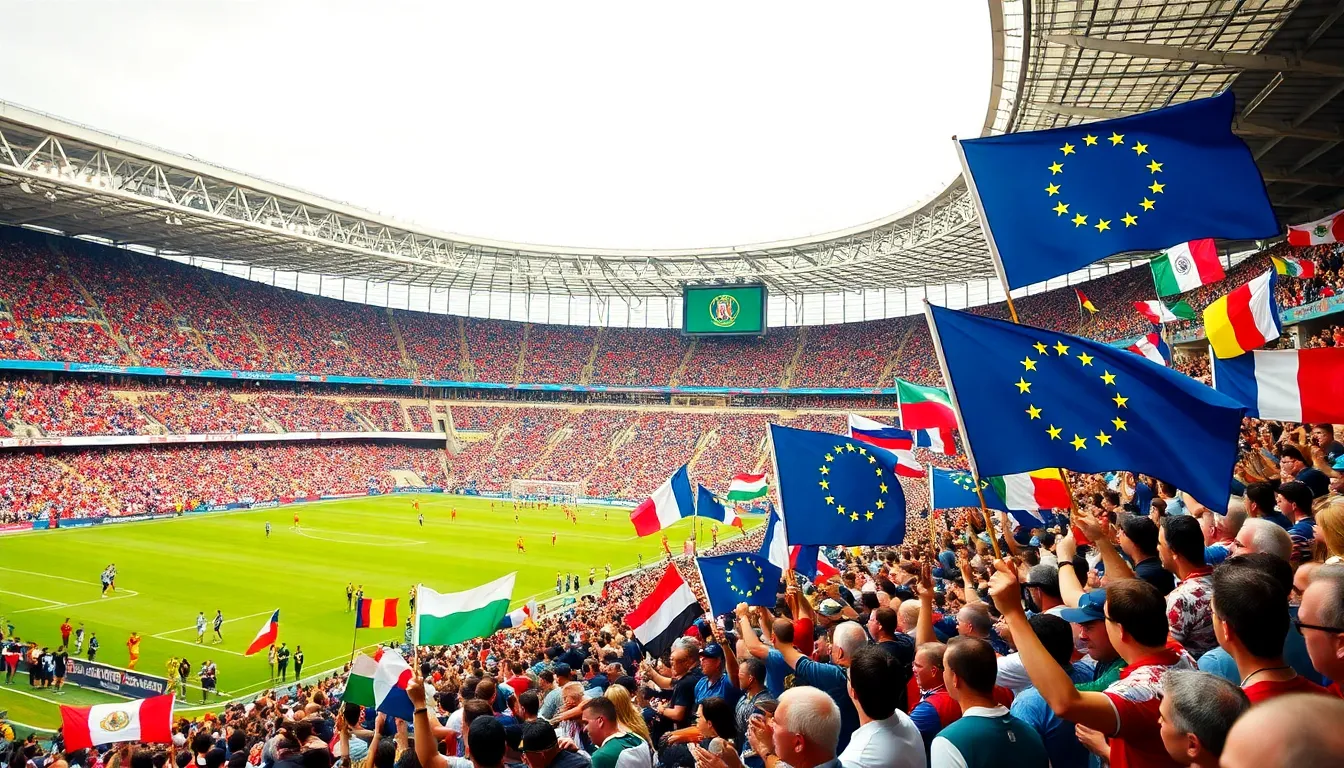Table of Contents
ToggleThe UEFA Euro Cup is like that friend who only shows up to the party every couple of years but always brings the best snacks. Fans eagerly await this prestigious tournament, which showcases Europe’s top national teams battling for glory on the pitch. But how often does this exciting event actually take place?
Overview of the Euro Cup
The UEFA Euro Cup, often referred to simply as the Euro, takes place every four years. This tournament showcases Europe’s elite national football teams competing for the championship title. National teams undergo a qualifying process before reaching the tournament, drawing considerable interest from fans.
The inaugural Euro occurred in 1960. Since then, it has evolved into a major international sporting event. The Euro Cup attracts wide television audiences, with millions tuning in to see the matches. The tournament format includes group stages followed by knockout rounds, leading to a climactic final match.
Every edition, the host nation changes, adding diversity and local flavor. Countries like France, Italy, and Spain have hosted in the past, contributing to the competition’s rich history. The tournament not only celebrates football excellence but also promotes camaraderie among fans from different nations.
Champions are crowned during a month-long celebration of sport, culture, and national pride. In addition to the trophy, winning teams gain a place in the prestigious FIFA Confederations Cup. Recent tournaments experienced mixed outcomes, with underdogs occasionally triumphing over favorites, enhancing the tournament’s allure.
The Euro Cup’s frequency and excitement ensure it remains one of the most anticipated football events globally. Future tournaments are already generating buzz, as countries await their chance to compete and showcase their talent on an international stage.
History of the Euro Cup

The UEFA Euro Cup has a rich history marked by significant milestones and memorable moments that define its legacy. Since its inaugural tournament in 1960, the event has captured the hearts of football fans worldwide.
Key Milestones
1960 marked the start of the Euro Cup with the first tournament held in France. UEFA introduced the competition to showcase Europe’s national teams. In 1984, France emerged victorious for the first time as the host nation, solidifying its reputation. The 1996 tournament in England saw the introduction of the knockout phase, enhancing excitement. A significant moment occurred in 2000 when France secured its second title, highlighting its dominance. The championship expanded to include 24 teams in 2016, allowing more nations to participate. The latest edition took place in 2021, showcasing countries across Europe and embracing the spirit of unity.
Notable Moments
Memorable events defined the Euro Cup’s history, captivating audiences globally. In 2004, Greece surprised everyone by defeating Portugal in the final, marking a shocking upset. Extra time drama prevailed in the 2016 semi-final when Portugal eliminated Wales, showcasing resilience. The 1992 tournament featured Denmark, who entered as a late replacement and clinched the title against all odds. A memorable goal was scored by Marco Tardelli in 1982, celebrated for its emotional intensity. The 2012 final held in Kiev saw Spain dominate Italy, winning 4-0 to complete a historic title defence. Each edition brings excitement, passion, and unforgettable moments that solidify the Euro Cup’s place in football history.
Frequency of the Euro Cup
The UEFA Euro Cup takes place every four years, capturing the excitement of football fans across Europe. Each tournament involves rigorous qualifying matches, leading to a competition that showcases elite national teams.
Biennial Format
Currently, the Euro Cup features a four-year cycle. This schedule aligns with major football events, allowing fans to enjoy a consistent rhythm of international competition. Each edition typically occurs in the summer months, spanning approximately a month. These tournaments engage millions of viewers while fostering national pride and unity among participating countries.
Changes Over the Years
Over the decades, the format of the Euro Cup has evolved significantly. Initially, the tournament included only four teams in a knockout format. Today, 24 teams participate, engaging in a group stage followed by knockout rounds. This expansion enhances the excitement and inclusivity of the competition. Additionally, changes in venues have allowed diverse cultures to host, further enriching the event. Milestones from past tournaments highlight the tournament’s growth and the increasing level of competition among nations.
Current Euro Cup Schedule
The Euro Cup occurs every four years, maintaining its stature as one of football’s premier tournaments. Fans eagerly anticipate the next scheduled tournament in 2024.
Next Scheduled Tournament
The upcoming Euro Cup takes place in 2024, highlighting Europe’s top national teams. This edition promises excitement and competitive spirit, drawing extensive interest from fans and participants alike. Nations are actively preparing their squads for a chance at glory, and enthusiasm is already building.
Location and Dates
Germany hosts the 2024 Euro Cup, providing a vibrant backdrop for this esteemed tournament. The event runs from June 14 to July 14, 2024, featuring matches in various iconic stadiums across the country. Teams compete in group stages before advancing to knockout rounds, culminating in a thrilling final. Locations include Berlin, Munich, and Dortmund, all of which enhance the tournament’s appeal through their rich culture and football history.
Impact of the Euro Cup
The Euro Cup influences various aspects of society, from economies to cultures.
Economic Benefits
Hosting the Euro Cup significantly boosts the host nation’s economy. Local businesses see increased sales, as restaurants, hotels, and shops welcome thousands of fans. In addition, employment opportunities surge in hospitality and event management sectors. According to studies, the economic impact can exceed €1 billion, benefiting both local and national economies. Increased tourism leads to long-term growth, with lasting benefits long after the tournament ends. Cities invest in infrastructure improvements, ensuring enduring advantages for residents and visitors alike.
Cultural Significance
The Euro Cup celebrates diverse cultures across Europe. Each tournament showcases unique traditions, music, and cuisine, enriching the fan experience. National pride surges as teams unite supporters under a common banner. This event fosters inclusivity and understanding among different nations. Through shared experiences, fans forge connections that transcend borders. Additionally, the tournament emphasizes cultural exchange, as countries present their heritage on a global stage. Each edition cultivates a legacy that inspires unity and sportsmanship among participants.
The UEFA Euro Cup stands as a testament to the passion and unity of European football. Its four-year cycle builds anticipation and excitement among fans and players alike. Each tournament not only showcases elite talent but also fosters cultural exchange and national pride.
As the 2024 edition approaches, the host nation Germany prepares to welcome the world to its iconic stadiums. The Euro Cup’s rich history and evolving format continue to captivate audiences, ensuring that this prestigious event remains a highlight on the international sports calendar. Fans can look forward to unforgettable moments and thrilling matches that define the spirit of competition.




